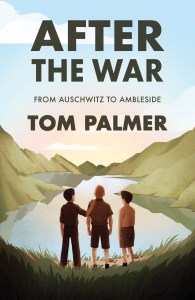This week we talk to sports enthusiast and children’s author, Tom Palmer
Q: Hi Tom Palmer, how are you doing? How was your lockdown?
I’m okay, thanks. Lockdown was mixed. The general worry about the country, the world and everyone suffering was tough to cope with. For my family – work-wise – it’s been very hard and still is. But 100,000s of families are experiencing the same, so I can’t complain. The silver lining has been spending lots of time with my wife and daughter because I have been home all the time. That’s been lovely.
Q: Your latest book, After the War, is about three boys who arrive in the Lake District after surviving a concentration camp. It was inspired by actual survivors who were taken in by the people of Lakeland. How did you hear about this amazing story?
My wife heard a radio programme about the Windermere Boys. She insisted I listen to it. I am so glad she did. Then I met up with the Lake District Holocaust Project at Windermere, and they helped me learn all I needed to know. You can hear the survivors talk on their website. It is well worth it.
Q: Why do you think it is important that children learn about this kind of history?
After the War is about refugees 75 years ago, what they went through to get here, how they were treated, and how they went on to become wonderful citizens of the UK. If we understand what it means for us to treat refugees who come to the UK well, it will help us treat current and future refugees well. Also, I think it is important to know the facts about the Holocaust. We can learn from history and use those lessons to help us challenge events today.

Q: Children’s literature is such a valuable way to teach young people about the past – which book did you read as a child that you felt taught you something valuable?
I don’t have one book in mind, but those books that showed the lives of children in other parts of the world helped me understand that our way of life in the UK is different to other places in the world. Also, it is good that there are different ways to live, and we should respect everybody’s right to live how they want to so long as they do not harm others.
Q: A lot of your books focus on sport and you say sports magazines were how you first became interested in reading – what is it about sport that you find fits with children’s literature so well?
I think it is just that lots of girls and boys love and take part in sport, so if we write fiction about it they will see themselves and their lives in stories. Some children – me included – struggle to find something to read if it is not about a topic we care about. Sports fiction does that, I hope. The bottom line is: fiction should be diverse in who it is about and what it is about so that there is something for everybody.
Q: You do a lot of school visits – have the kids you’ve met taught you anything or inspired something in your own writing?
Yes. In fact, I often ask classes to read my books and give me feedback. I don’t do that for fun, and I do make changes based on what the children say. I love how honest children are about books – they’ll say what they like and don’t like, and that helps me make my books better, I think.
Q: 1 in 8 schools across Britain do not have a library – have you yourself had experience of the educational inequality within the school system?
Yes. When I am doing an assembly in a school, I can tell if they have a library and a school librarian just by chatting with them about books and the wider world. A school library is a vital foundation for all school subjects, for empathy and kindness, and understanding of the world we live in. It is very sad when I am in a school where reading for pleasure is not valued. And – you are right – it is not fair on the children.
Q: Apart from your own books of course, which book or books do you think all children in schools should be given to read?
There is no one book all children should read. Instead, every child should have a library and a librarian who can match the right child with the right book—1000s of books for 1000s of children.
Q: Ok, so final question, Tom Palmer – if all the libraries in the world were burning and you could only save three books, what would they be and why?
A Shirley Hughes compilation for younger readers. A collection of Rosemary Sutcliff historical fiction. Wuthering Heights by Emily Bronte. But I know a lot of people would disagree with me…
Find After the War now at your local library, local independent bookshops: Waterstones, Amazon and Kindle. 10% of author royalties will be donated to the Lake District Holocaust Project. https://tompalmer.co.uk/after-the-war/
Thank you for visiting our blog. Our vision here at Books2All is a world where every child finds the books that help them reach their true potential. If you have spare books in good condition at home that you think might be appropriate for school children, please sign up for our app’s pre-release waiting list. If you represent a school, please register to receive books for your students.
Banner image courtesy of Glynis Shannon from Pixabay


Aw – I loved reading Shirley Hughes’ “Alfie and Annie Rose” to my children 🙂